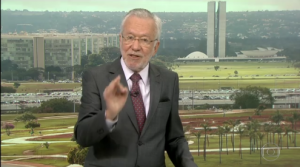
Watch Alexandre Garcia's comment on the damage that smuggling causes to the country and society and the initiatives to combat it:
Good Morning Brasil_Alexandre Garcia

Watch Alexandre Garcia's comment on the damage that smuggling causes to the country and society and the initiatives to combat it:
Good Morning Brasil_Alexandre Garcia
By Edson Vismona (*)
Brazil is the country of the future. Certainly a good part of Brazilians have heard this catchphrase. We grew up listening that this is a developing country, with great potential, a sleeping giant.
Why, then, does this future cost so much to arrive? How can we get rid of the obstacles that prevent Brazil from developing?
In fact, the nation we dream of will only begin to be built if we put aside rhetoric and go for immediate and effective actions for change, with the commitment of all.
Investigative reporter Giovanni Grizotti of Fantástico followed the Federal Police's Operation Iron Chair for months, which arrested more than 20 suspects of being part of a gang that stole cars to use in the distribution of smuggled cigarettes from Paraguay.
Source: G1.Globo.com (29/02)
Find out which are the entities, companies and associations that participate in the Movement in Defense of the Legal Market and that were present in Brasilia, on March 03, at the press conference on the National Day to Combat Smuggling:
| 3M Brazil |
| ABAD - Brazilian Association of Wholesalers and Distributors of Industrialized Products |
| ABCF - Brazilian Association to Combat Counterfeiting |
| ABCFARMA - BRAZILIAN PHARMACEUTICAL TRADE ASSOCIATION |
| ABES - Brazilian Software Association |
| ABIFUMO - Brazilian Association of the Tobacco Industry; |
| ABIHPEC- Brazilian Association of the Personal Hygiene, Perfumery and Cosmetics Industry |
| ABIÓPTICA - Brazilian Optical Industry Association |
| ABIP Brazilian Association of the Bakery Industry |
| ABIR - Brazilian Association of Sodas and Non-Alcoholic Beverages Industry |
| ABIT - Brazilian Association of the Textile and Clothing Industry |
| ABPI - Brazilian Intellectual Property Association |
| ABRABE - Brazilian Beverage Association |
| Abrasel - Association of Bars and Restaurants / DF |
| ABRESI - Brazilian Association of Gastronomy, Lodging and Tourism |
| Abril Group |
| ABRINQ - Brazilian Association of Toy Manufacturers |
| ABTA- Brazilian Pay-TV Association |
| ACDF - Commercial Association of the Federal District |
| ACICG - Campo Grande Commercial and Industrial Association |
| ANDAV - National Association of Agricultural and Veterinary Input Distributors |
| ASBRAC - Brazilian Association Against the Crime of Smuggling |
| Asics |
| BPG - Brand Protection Group |
| CACB - Confederation of Brazilian Trade and Business Associations |
| Chamber of Deputies - DEM / PB |
| Chamber of Deputies - PSB / RS |
| CNTUR - Brazilian Confederation of Tourism |
| Dominium Consulting |
| French Embassy |
| FBHA - Brazilian Federation of Accommodation and Food |
| FECOMERCIO - DF |
| FECOMERCIO - PR |
| FECOMERCIO - Rondônia |
| FIEAM - Federation of Industries of the State of Amazonas |
| FNCP - National Forum to Combat Piracy |
| Idesf - Institute of Economic and Social Development of Borders |
| INSTITUTO BRASIL LEGAL - Brazilian Institute for the Defense of Competitiveness; |
| Instituto ETCO - Brazilian Institute of Competitive Ethics |
| Meirelles Institute |
| Lexmark International do Brasil |
| MPA - Motion Picture Association - Latin America |
| Phillip Morris |
| Federal police |
| IRS |
| Sebrae - DF |
| Sefaz / AL - Secretariat of the Farm of Alagoas |
| SEHAL - Union of Hosting Companies |
| Senac - National |
| Sesc - National |
| SIDEMVIDEO - Union of Companies for Video Cassette Rental in the State of São Paulo |
| SINCOFARMA MINAS - Union of Retail Trade in Pharmaceutical Products of the State of Minas Gerais |
| SindHobar DF - HOTELS, RESTAURANTS, BARS AND SIMILARS UNION BRASILIA DF |
| Sindicel - Union of the Industry of Electrical Conductors, Drawing and Lamination of Non-Ferrous Metals of the State of São Paulo |
| SINDIOPTICA - Union of Retail Trade of Optical and Photographic Material of the Federal District |
| Sinditabaco - Interstate Tobacco Industry Union |
| SindPoa - SHRBS - Porto Alegre Hotels, Restaurants, Bars and Similar Union |
| Siqueira Castro Advogados / ICI - Intellectual Capital Institute |

Brasilia, March 3, 2015 - Brazil is losing the fight for smuggling. Products from different sectors enter the country illegally, without technical or health certification and without collecting taxes, which ends up generating a huge tax evasion to public coffers, in addition to harming people's health, subtracting Brazilian jobs, increasing insecurity in cities and borders and undermine national sovereignty and defense.
Annually, billions of reais in taxes are no longer collected due to the illegal entry of products into the country. The FNCP estimates that the country has losses of around R $ 100 billion with contraband (sector losses + tax evasion), a sufficient resource to build 1,4 million low-income houses, 105 thousand km of highways, 77 thousand hospital beds and 19 thousand daycare centers.
As a way to make the population aware of this serious problem, and to seek solutions from the authorities, the Movement for the Defense of the Legal Market, a coalition formed by more than 70 entities representing the Brazilian economy led by the Instituto de Ética Concorrencial (ETCO) and the National Forum Against Piracy and Illegality (FNCP), they decided to institute the National Day to Combat Smuggling.
The idea is that annually, always on March 3, society can debate issues related to smuggling from different perspectives: economic, social, national sovereign impacts, among others. In addition, the entities involved intend to forward proposals for actions that can contribute to the fight against smuggling to members of the executive and legislative branches.
This year, several events and initiatives mark the National Day to Combat Smuggling:
Study Idesf - The Institute for Economic and Social Development of Borders (Idesf) developed, in partnership with the Gaúcha Public Opinion and Statistics Company (Egope) the study 'The Cost of Smuggling', which aims to analyze the main impacts of smuggling on society Brazilian, focusing on the 10 most smuggled products from Paraguay to Brazil.
The main conclusion of the study shows that the cost of smuggling varies from 19% to 22% of the value of the cargo, value added to the purchase price of the product in Paraguay, consisting of logistics, corruption, loss, among other factors. The study also reveals that criminals' profitability is enormous: in the case of cigarettes, the most smuggled product, it ranges from 179% to 231%.
Among other findings of the study, it is possible to highlight:
The smuggling champion is the cigarette, which accounts for more than 67% of the products that cross the borders illegally, which is equivalent to R $ 6,4 billion in industry losses and tax evasion.
Retail Ad - Idesf, in partnership with the Brazilian Association to Combat Counterfeiting (ABCF), the Brazilian Association of Gastronomy, Lodging and Tourism (Abresi), the Brazilian Association of Bars and Restaurants (Abrasel) and the Brazilian Federation of Accommodation and Food (FBHA) ), runs on March 3 an advertising campaign to raise awareness about the law that prohibits the sale of contraband cigarettes in the country. The objective is to alert traders about possible penalties for those who commit this crime.
ABCF Balance Sheet - The Brazilian Association to Combat Counterfeiting (ABCF) released this Tuesday in 'Paulo a balance of operations for the seizure of illegal goods in the country in 2014. In total, the entity carried out, in partnership with the civil police of several states, about 1.200 operations, growth of 34% over the previous year. Among the main products seized are cigarettes, clothing and luxury items.
The State of São Paulo, the main consumer market in the country, is the preferred final destination of criminals. In second place is Paraná, followed by Rio Grande do Sul, Minas Gerais, Bahia, Pernambuco, Goiás, Pará and Rio de Janeiro as the biggest markets affected by the counterfeiting and smuggling of industrialized products.
Engagement of mayors - In March, the National Movement for the Defense of the Legal Market will forward material to the more than 5.500 municipalities in Brazil. The aim is to inform the mayors that the crime of smuggling directly affects cities, since part of the unpaid taxes should go to municipal coffers. In addition, the movement expects these mayors to sensitize deputies and senators to institute tough measures to fight crime.
Awards - To encourage the development of public initiatives in all spheres that help the country to abandon illegal commercial practices such as smuggling, piracy and counterfeiting, ETCO, FNCP and dozens of other entities are launching the 1st Management Efficiency Award Public Policy for Initiatives to Fight the Illegal Market. The rules will be announced in September 2015, and delivery is already scheduled for March 3, 2016.
Destruction of smuggled products - Two cigarette destruction actions have been carried out today. In São Paulo, the action was left to ABCF; in Foz do Iguaçu, the main port of entry for smuggling to Brazil, the initiative carried out by the Federal Revenue Service of Foz in partnership with Idesf.
DIALOGUE WITH THE GOVERNMENT
On February 25, the Movement for the Defense of the Brazilian Legal Market sent a letter to the main ministers and other authorities related to the topic. The objective: to inform the authorities about the actions that the Movement would be taking on March 3, and to request meetings to present a list of three measures that can be debated in the short and medium term, and which are fundamental for combating smuggling:
Watch the full article published in the National Newspaper of 03/03 about the National Day to Combat Smuggling
[evp_embed_video url = ”https://www.etco.org.br/videos/contrabando-de-mercadorias-jn-03032015.mp4 ″]Vehicle: TV Globo - SP Publication: 03/03/2015 Program: JORNAL NACIONAL Time: 20:39 Inclusion: 03/03/2015 20:51:00 Time: 2m 35s | Combating the smuggling of goods
Watch the full article on the size of contraband in the country, aired on BOM DIA BRASIL on 3/03
[evp_embed_video url = ”https://www.etco.org.br/videos/dia-nacional-combate-ao-contrabando.mp4 ″]National Day Against Smuggling
A crime that affects all major Brazilian cities: smuggling. On the National Day to Combat Smuggling, several vehicles, including Rede Globo's Bom Dia Brasil, broadcast reports on the main figures of the criminal smuggling industry.
Cigarettes represent almost 70% of all smuggled products. And with cigarettes alone, Brazil fails to collect R $ 4,5 billion in taxes. Smuggling enters the country mainly through the Foz do Iguaçu region and is distributed to all states.
The Federal Public Ministry estimates that only between 5% and 10% of all smuggled products entering Brazil are seized. This is partly explained by the extent of our borders. The Brazilian authorities are responsible for inspecting an area that extends over 17 thousand km², passing through 11 Brazilian states and 10 countries, including Paraguay, the main supplier of smuggled goods.
The Fronteiras Institute for Economic and Social Development, which works in Foz do Iguaçu, spent seven months preparing a study. “It is organized crime, they are large gangs. Extremely specialized who take this product from here on a large scale and take it to Brazilian capitals ”, says IDESF president Luciano Stremel Barro.
Correction note: In the report aired on March 3, 2015, Bom Dia Brasil reported that Brazil fails to collect R $ 4,5 million in taxes. In fact, the value is R $ 4,5 billion. The information was corrected at 12:15 on March 3.
